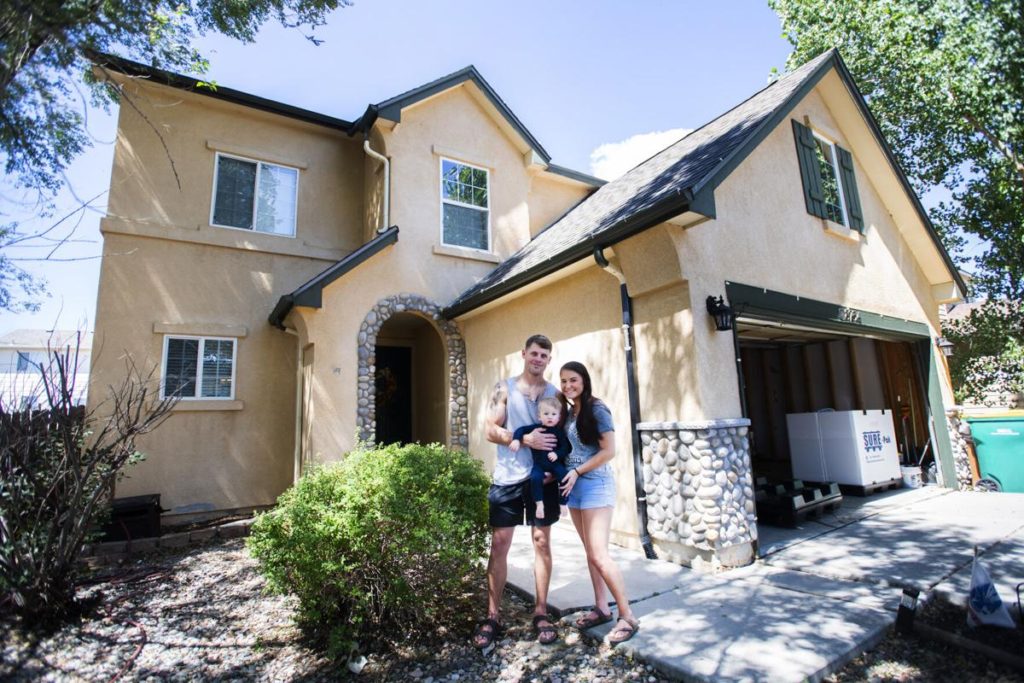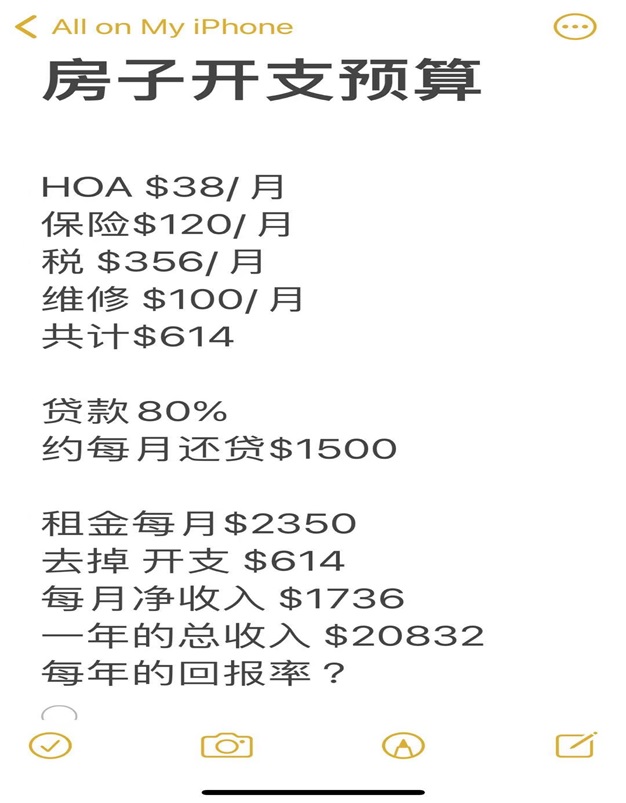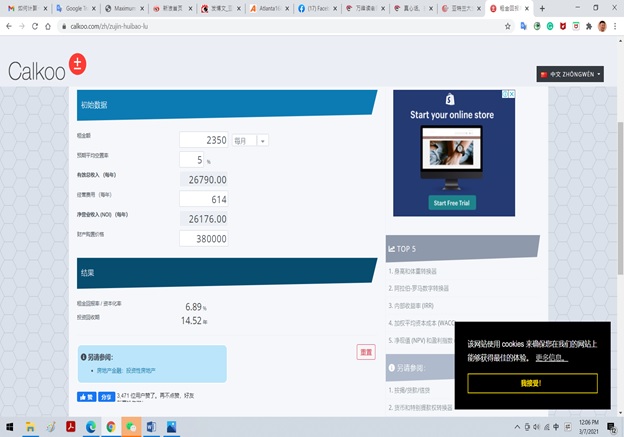
Corporate homebuyers take unfair bite out of Colorado Springs housing market, real estate agents complain
By Rich Laden
8/30/2021

Invitation Homes of Dallas has purchased more than 300 homes in the Colorado Springs area over the last five years because of people just like Jacob and Caley Harel.
Jacob, a sergeant in the Army, was being transferred last year to Fort Carson from Schoefield Barracks in Hawaii. He, Caley, and their newborn son, also named Jacob, began searching for a Springs-area home.
They considered buying, but Jacob worried the COVID-19 pandemic could lead to a housing crash and plunging values. The couple also was concerned about soaring costs, Caley said; homes were going for thousands over asking price and it was difficult to know what to offer.

Tel: 551-580-4856 | Email: F.WINNIE.S@GMAIL.COM
With their move from Hawaii two weeks away and still without a place to live, Caley began daily checks of the website of Invitation Homes. The Dallas-based company is the nation’s largest home-rental company and owns more than 80,000 properties in 16 markets, according to its website. It’s also among corporate homebuyers, including Home Partners of America and Zillow, that have ramped up their presence in the Pikes Peak region in recent years
Through Invitation Homes, Caley found a three-bedroom, 2½-bath house in Fountain, south of Colorado Springs.
“As soon as we saw this one, we really liked the bedrooms and the amount of space and everything, so we jumped on this as soon as we could,” Caley said.
They moved in early October, and the roomy home worked out great, the couple said. The commute to Fort Carson was easy for Jacob, while Caley liked the maintenance-free aspect of being renters.
The Harels, though, already are on the move. Caley and their son, now 1, are moving home to Alabama to be near relatives because Jacob is being deployed to the Middle East. Still, they enjoyed their time in the Invitation Homes rental property.
“It’s kind of like owning a house, but then like if something breaks, you can call people to come fix it for free,” Caley said. “It’s not on your responsibility. It’s been a lot nicer than owning, I think.”
While the Harels are happy, some local real estate agents aren’t; they fret about the impact of corporate buyers such as Invitation Homes on the Springs housing market.
Corporate buyers purchase single-family, detached homes and townhomes that typically would have been bought by first-time buyers, existing homeowners looking to move up and empty nesters seeking to downsize.
But doing so takes the homes off the market at a time when there’s already a housing shortage, the agents say.
Some agents also accuse the large companies of aggressive tactics that pit their deep pockets against rank-and-file buyers; the companies pay with cash and their bids often exceed a seller’s asking price by as much as tens of thousands of dollars, which gives traditional buyers little chance to compete.
“They are aiding in the inflation of the market,” said Tiffany Lachnidt of Keller Williams Premier in Colorado Springs.
She remembers one of the first times she encountered a corporate buyer. The company bid more than $25,000 over the asking price for a home in a northeast side Springs neighborhood, which effectively boosted property values for all homes in the area by 8% to 9% in just a single month, she said.
And when sellers are presented with a cash offer that far-and-away exceeds other bids, not surprisingly they go with the highest offer, she said.
“Because they’re cash, because they close fast, our owner-occupied buyers can’t compete,” Lachnidt said.
Joe Clement, broker-owner of Re/Max Properties, said many first-time buyers will scrape together money for a down payment and make a reasonable offer on the home. Yet they lose out to corporate buyers.
“It’s cash and it’s for more money, and the young couple goes as high as they can go,” Clement said. “The seller’s looking at it, like, ‘I’ve got to take what’s best for me and my family. And the cash and the extra money and whatever is where I need to be.’ And they take the offer from the big guys.”
Relatively few homeowners who’ve lived in their house for decades and raised their kids there will reject a corporate buyer’s over-the-top offer in favor of selling to another family, Clement said.
“My heart goes out to the young families trying to get a house because they’ve got to compete with this,” he said.
Corporate buyers, however, counter that they provide a product and service that homebuyers and renters demand in markets such as Colorado Springs. And, they say, they hardly can have such an ominous effect on the market since the homes they buy are a fraction of the overall number bought and sold each year.
While Invitation Homes rents its properties, Chicago-based Home Partners purchases houses as rentals, but gives tenants an option to buy. Zillow, the Seattle online housing service, also buys homes in Colorado Springs and other markets with a strategy to quickly sell them for a profit.
Combined, the companies have bought nearly 1,600 single-family homes in the Colorado Springs area from Jan. 1, 2016, through Aug. 20 of this year. That number is based on a review of El Paso County land records, though the actual number could be different because it’s sometimes difficult to identify corporate buyers whose purchases often are made through limited liability companies.
Founded in 2012, Home Partners owns 17,000 homes nationwide, according to its website. It’s been the most active corporate buyer in the Colorado Springs area with 1,050 homes purchased between Jan. 1, 2016, and Aug. 20, according to El Paso County land records. Of Home Partners’ purchases, 302, or almost 29%, have come just in 2021.
Home Partners will have more financial resources for purchases going forward. Blackstone Real Estate Income Trust, an arm of the Blackstone Group, a New York-based private equity firm that manages nearly $650 billion in global assets, is buying Home Partners in a deal that values the company at $6 billion, according to national news reports.
Invitation Homes, meanwhile, has purchased 329 homes in El Paso County between 2016 and Aug. 20; of that number, two-thirds, or 222, have come in the first 8½ months of this year. Coincidentally, Invitation Homes was founded by Blackstone, which sold its interests in the company two years ago.
Zillow, which launched a homebuying service in 2018 and expanded it to Colorado Springs the following year, has purchased just over 100 homes through Aug. 20, records show.
Such companies are buying homes at a time when strong demand and a housing shortage have made it tough for many traditional buyers to find homes.
The corporate buyers, however, reject the notion that they’re homebuying bullies.
Pikes Peak Association of Realtors reports show that more than 90,000 homes were sold from Jan. 1, 2016, through July of this year. The roughly 1,600 homes purchased by Invitation Homes, Homes Partners of America and Zillow over that span are less than 2% of the Realtors Association’s total.
“The truth is, institutional ownership remains a very small part of the overall home rental market and an even smaller slice of the overall housing market,” Invitation Homes said via email in response to Gazette questions. “Invitation Homes is a tiny sliver of both. We represent less than 0.5% of the total single-family rental market, and less than 0.1% of single-family homes in the entire country.”
Invitation Homes says its business model also means it’s not necessarily competing with first-time buyers. The company’s purchases include homes that need improvements, such as new or updated appliances, cabinetry and flooring.
“This is not with the intention of flipping the home, but providing residents with the layouts and amenities they expect,” Invitation Homes said of its upgrades. “It’s important to note that this also places us in a different market than most first-time homebuyers who typically don’t want to take on a home that requires significant immediate investment.”
Home Partners of America, meanwhile, operates its rent-to-own concept that effectively allows renters to try before they buy.
Some potential buyers can’t afford a home, don’t qualify for a mortgage or are hesitant to make a large financial commitment that comes with purchasing a house, Home Partners says on its website. Others might be new to an area and want to rent before they put down roots.
Home Partners offers to purchase properties on behalf of applicants who want to rent and possibly buy and who’ve cleared credit, background and income checks with the company, among other qualifications. As a result, purchases by Home Partners are demand driven, the company says.
Applicants then work with local real estate agents to select a home that fits their needs and income levels.
If Home Partners signs off on the home, the company makes what it calls “a competitive cash offer” to a seller. If its bid is successful, Home Partners completes the purchase and begins the process of renting it to the tenant.
During the time they rent, tenants face annual rent increases of up to 3.75%. If they buy the home, they can expect to pay a price that rises 3% to 5% a year from the original price paid by Home Partners, depending on the home’s location, according to the company’s website.
“The fundamental premise of the (Home Partners of America) platform is to provide residents with the opportunity to live in their chosen home with the option to purchase it,” Jacob Werner, a real estate senior managing director for new owner Blackstone, said via email.
How many people actually buy homes from Home Partners of America? The company has been quoted as saying that upward of 20% of its renters buy homes.
But while Home Partners of America has bought 1,050 Colorado Springs-area homes since the start of 2016, it’s sold only about 75 properties in El Paso County during that span, land records show.
“To me, that means their process to help renters turn into homeowners isn’t very realistic or very attractive,” said Eddie Hurt of ERA Shields Real Estate in the Colorado Springs. “To me, if that’s kind of your pump to get these renters and to buy these properties, then you should have a significant number of those renters turn into homeowners. That would be a good thing. In reality, the vast, vast majority of them are not ever turning into actual homeowners.”
Hurt also worries what could happen to property values if the housing bubble bursts and corporate buyers begin to dump their homes at below-market prices.
He and Lachnidt, of Keller Williams Premier, also question if the out-of-state companies maintain their homes to the same degree as local owners, including Springs-area investors.
Lachnidt, who herself has bought homes as investment properties, said she purchased a property last year that had been used as a meth lab.
“We took out all the drywall, repaired the house, replaced the HVAC system, replaced every porous surface in the house and then re-listed and sold it to a buyer,” Lachnidt said. “There’s investors who go in there and fix up properties and flip them. Maybe they keep them as investment properties, maybe they don’t.
“But the problem is, when you’re selling to these institutional buyers, they will never resell these homes and they manage them from a distance,” she said. “So one of the biggest complaints you’ll find from consumers on Home Partners is that they’ve become slumlords.”
Home Partners didn’t respond to a question about the care of its properties, but the company has a property management firm that maintains its homes and supports tenants during their lease, according to the Home Partners’ website.
Invitation Homes rejected any suggestion that it fails to keep up its homes; the company says it routinely maintains homes “to a high standard.”
“We conduct both proactive and reactive service on each home,” Invitation Homes said via email. “Our business is successful because we provide the product and the ongoing service that our residents want; if we didn’t, we wouldn’t be experiencing more than 98% occupancy and renewal rates north of 70%.”
Not all real estate agents object to the influx of corporate buyers such as Invitation Homes and Home Partners of America.
Rick Van Wieren of Re/Max Properties said he represented a couple who had purchased a townhome last year for $282,500 and listed in the spring for $340,000.
Home Partners bought it for cash, and paid what Van Wieren considered to be an inflated price of $380,000. The $40,000 difference between the list and sale price was equal to the annual salary of one of the sellers, he said.
“We had bids well above the asking price,” Van Wieren said. “But we didn’t have anything going to $380,000. … I wouldn’t have paid $380,000 for that townhome. But why wouldn’t I as his agent want him to sell to the highest bidder to maximize his return? And these are young kids.”
The big money paid out by corporate buyers is one reason many real estate agents don’t like corporate buyers, though Van Wieren said the large companies obtain their financing and make their purchases in similar ways to other businesses in the commercial world.
“Honestly, I think part of the frustration is just that when you’re up against them, you tend not to win,” Van Wieren said. “So they make it feel like not a level playing field.”
How Commercial Property Owners May Avoid (Or Defeat) Foreclosure
By John Higgins
John Frank Higgins is a New Mexico-based attorney helping clients turn water into wine since 2009.
5/23/2021
If you own property that’s central to your business, or if owning and leasing commercial property is your business, then making those monthly mortgage payments may get pretty tough at times. When customers aren’t coming in or when renters suffering the same problem can’t pony up, the cash flow simply isn’t there, and reserves can rapidly run dry.
Momentary panic and even despair are understandable, even allowable, but once you’ve had a minute to wrap your head around the situation, it’s time for an action plan. There are things you can do to avoid bankruptcy, avoid foreclosure, keep your property and keep your business — and maybe even keep your mortgage lender happy.
1. Be Preemptive And Proactive
It’s easier to predict some ongoing cash flow difficulties than others — for example, in a pandemic. (This really isn’t an article about Covid-19, and the advice here is true at all times, but we know we’ll be on this particular economic roller-coaster for a little while yet.) When the writing’s on the wall, don’t wait for the worst to happen. Pick up the phone and talk to your lender to see what you can do.
Most commercial mortgage lenders have no desire to be in the real estate business. When they foreclose, they not only have to go through the legal process of taking title to (and physical possession of) your property, but they also have to find a buyer, negotiate a sale and go through closing. That can take months or years, during which time they’re not receiving a penny. And then, they can generally only recoup the face value of the loan, possibly with some additional penalties and fees — they’ll lose out on most of the interest you would have paid, which is where they profit.
All of this gives lenders an incentive to keep you paying something on your mortgage if it’s at all feasible for you to recover and catch back up eventually. Though some lenders are less flexible than others, many might be willing to temporarily adjust terms, suspend payments or find other ways to work with you so you can keep your commercial property and they can keep collecting. It’s always worth an inquiry, and your lawyer or accountant may be able to help.
2. Missed Payments May Mean Opportunity
Maybe you talked to your lender already and they wouldn’t budge, meaning a missed payment is looming right around the corner. Maybe you’ve already missed a payment. In that case, you may face more of an uphill battle, but you still have options.
If you haven’t already spoken to your lender, now would be the time to do that, and again, a lawyer or accountant may be able to help. Otherwise, most lenders’ next step will be to “call in” the loan, meaning they’ll demand full repayment of the loan, pronto. A provision allowing lenders to do this at the first sign of default is standard in most commercial mortgage contracts, and it is an extreme but effective way for lenders to protect their interests.
Assuming you don’t have cash on hand to pay your entire mortgage balance, you can do a few things. If you’re ready to walk away from your business, you can try to sell the property, pay off the loan and possibly pocket a bit of the proceeds if there’s anything left over. This requires finding a buyer willing to pay at least the balance of the mortgage, which may not be possible if you’re underwater on your loan or if commercial property investment is slow. You could also simply walk away from the property and allow a foreclosure to proceed, though this isn’t always as simple as it sounds and can damage your future ability to borrow, personally and as a business entity.
If you want to hang onto your property, you could also try filing for Chapter 11 protection, which allows you to reorganize your debt so you can keep running your business. This is a lengthy and expensive process, however, and you’ll have to demonstrate that you can realistically run the business profitably in the near future and ultimately pay off your debts.
Your last option is to fight the call-in provision in court. If there’s a good reason you can’t live up to your contractual obligations, your lender may not be able to enforce it. You’ll need to speak with a lawyer about your specific circumstances and the laws and court mechanisms in your state to determine how best to proceed.
3. Fighting Foreclosure
If all else fails and you’re unable to fend off foreclosure proceedings, all is not lost. Though some states allow foreclosures to begin before anything is filed in court — “nonjudicial foreclosure” states — all states allow a challenge to a foreclosure proceeding to be brought in court. In a judicial foreclosure state, you’ll get that chance upfront, when the lender files for foreclosure; in a nonjudicial foreclosure state, you (with your lawyer) will initiate the proceeding.
Either way, courts generally treat commercial mortgage contracts like any other contract. That means, just as in a challenge to a call-in provision, you’ll need to argue that there’s a good and legally recognized reason that you shouldn’t be held to the terms of your contract, at least temporarily. (Again, this advice isn’t limited to times of a global pandemic and widespread economic impacts, but Covid-19 might form part of a valid argument.)
With some ingenuity and perseverance, you may be able to stave off foreclosure until your business is back up on its feet. There’s nothing quite like a court order to get a lender off your back and get the breathing room you need.
Once things are running smoothly, you can always refinance.
The information provided here is not legal advice and does not purport to be a substitute for advice of counsel on any specific matter. For legal advice, you should consult with an attorney concerning your specific situation.
如何计算一个投资房产的租金回报率?
By Willy Rong
3/07/2021

一直以来都有人问我,如何计算一个投资房产的租金回报率?我答过,但总是似是而非。
今天就这个问题给出我的计算公式Return Of Investment (ROI),仅供大家参考。
这个问题要从两方面讨论,看你是全额现金买房?还是贷款80% 买房?
(全额现金买投资房产)租金回报率 = (12月的租金 – 一年的各种花费)/ 买房价
(贷款80%买投资房产)租金回报率 = (12月的租金 – 一年的各种花费和贷款 )/ (
20%首付+ Closing Cost )
我们还是以一个$38万美元买房实例来计算,比较直观:
房子开支预算:
HOA $38/月; 保险 $120/月; 税 $356/月; 维修 $100/月。
共计 $614。
贷款 80%, 约每月还贷$1500;
租金每月$2350;去掉开支 $614; 每月净收入 $1736;
一年的总收入 $20832。

问:一个$38万美元的房产,每年的回报率?
(全额现金买投资房产)租金回报率 = (12月的租金 – 一年的各种花费)/ 买房价
$38万美元房子的租金回报率 = 一年的总收入 $20832 / 买房价$380,000 = $0.0548
全额现金$38万美元房子的租金回报率一年约为:5.5%;
(贷款80%买投资房产)租金回报率 = (12月的租金 – 一年的各种花费和贷款 ) / (
20%买房首付 + Closing Cost)
$38万美元贷款80%房子的租金回报率 = (一年的总收入$20832 – $18000) / (首付 $
76000 + $5000 Closing Cost ) = $0.0349
$38万美元贷款80%买投资房产的租金回报率一年约为:3.5%.
这个$38万美元的房子在最好学区,房子升值潜力大!
考虑到加上房子产权equity 上涨的因素,一年在6%-8%。所以要加上一个Equity 增值
率,换句话说,是用$81000 买了一个$38万美元的房产,是用杠杆买的房子。
这里有2个概念:一个是租金回报率;一个是Equity 回报率;
利用杠杆买房,就要让银行在这个房子上也赚一些钱,所以贷款租金回报率3.5%.要低
于全额现金租金回报率5.5%,这个逻辑是对的,那个2% 回报率的差让银行赚去了。
什么是智慧?智慧就是解决问题的能力!
能够把一个复杂问题简单化,用直白的方式讲清楚,这也是智慧。
现在亚特兰大地区(佐治亚),一个房子的租金回报率大概在3% ~ 6%左右,真心话,
投资房净租金回报率6%是一个不错的回报。
你若嫌上面二手房一年的租金回报率还低,你可以全现金买126包租5年的项目,一年的
租金回报率为净6%。
下面是在网上找到的租金回报率计算器,大家可以去练习:
租金回报率
https://www.calkoo.com/zh/zujin-huibao-lu

提示:算大账不算小账,可能公式不够严谨,但逻辑是对的。
Source: http://www.mitbbs.com/article_t/Georgia/31320547.html
Six Spaces Home Staging

Contact: Hongliang Zhang
Tel: 571-474-8885
Email: zhl19740122@gmail.com
How to Calculate ROI on a Rental Property
Why it’s important to know a property’s ROI before buying real estate
By JEAN FOLGER
3/07/2021
One of the main reasons people invest is to increase their wealth. Although the motivations may differ between investors—some may want money for retirement, others may choose to sock away money for other life events like having a baby or for a wedding—making money is usually the basis of all investments. And it doesn’t matter where you put your money, whether it goes into the stock market, the bond market, or real estate. https://66fb8f8f96c41eb6be84c3a0428532d2.safeframe.googlesyndication.com/safeframe/1-0-37/html/container.html
Real estate is tangible property that’s made up of land, and generally includes any structures or resources found on that land. Investment properties are one example of a real estate investment. People usually purchase investment properties with the intent of making money through rental income. Some people buy investment properties with the intent of selling them after a short time.
Regardless of the intention, for investors who diversify their investment portfolio with real estate, it’s important to measure return on investment (ROI) to determine a property’s profitability. Here’s a quick look at ROI, how to calculate it for your rental property, and why it’s important that you know a property’s ROI before you make a real estate purchase.
KEY TAKEAWAYS
- Return on investment (ROI) measures how much money, or profit, is made on an investment as a percentage of the cost of that investment.
- To calculate the percentage ROI for a cash purchase, take the net profit or net gain on the investment and divide it by the original cost.
- If you have a mortgage, you’ll need to factor in your downpayment and mortgage payment.
- Other variables can affect your ROI including repair and maintenance costs, as well as your regular expenses.
What Is Return on Investment (ROI)?
Return on investment measures how much money, or profit, is made on an investment as a percentage of the cost of that investment. It shows how effectively and efficiently investment dollars are being used to generate profits. Knowing ROI allows investors to assess whether putting money into a particular investment is a wise choice or not.
ROI can be used for any investment—stocks, bonds, a savings account, and a piece of real estate. Calculating a meaningful ROI for a residential property can be challenging because calculations can be easily manipulated—certain variables can be included or excluded in the calculation. It can become especially difficult when investors have the option of paying cash or taking out a mortgage on the property.
Here, we’ll review two examples for calculating ROI on residential rental property: a cash purchase and one that’s financed with a mortgage.
The Formula for ROI
To calculate the profit or gain on any investment, first take the total return on the investment and subtract the original cost of the investment.
Because ROI is a profitability ratio, the profit is represented in percentage terms.
To calculate the percentage ROI, we take the net profit, or net gain, on the investment and divide it by the original cost.
For instance, if you buy ABC stock for $1,000 and sell it two years later for $1,600, the net profit is $600 ($1,600 – $1,000). ROI on the stock is 60% [$600 (net profit) ÷ $1,000 (cost) = 0.60].
Calculating ROI on Rental Properties
The above equation seems simple enough, but keep in mind that there are a number of variables that come into play with real estate that can affect ROI numbers. These include repair and maintenance expenses, and methods of figuring leverage—the amount of money borrowed with interest to make the initial investment. Of course, financing terms can greatly affect the overall cost of the investment.
ROI for Cash Transactions
Calculating a property’s ROI is fairly straightforward if you buy a property with cash. Here’s an example of a rental property purchased with cash:
- You paid $100,000 in cash for the rental property.
- The closing costs were $1,000 and remodeling costs totaled $9,000, bringing your total investment to $110,000 for the property.
- You collected $1,000 in rent every month.
A year later:
- You earned $12,000 in rental income for those 12 months.
- Expenses including the water bill, property taxes, and insurance, totaled $2,400 for the year. or $200 per month.
- Your annual return was $9,600 ($12,000 – $2,400).
To calculate the property’s ROI:
- Divide the annual return ($9,600) by the amount of the total investment, or $110,000.
- ROI = $9,600 ÷ $110,000 = 0.087 or 8.7%.
- Your ROI was 8.7%.
ROI for Financed Transactions
Calculating the ROI on financed transactions is more involved.
For example, assume you bought the same $100,000 rental property as above, but instead of paying cash, you took out a mortgage.
- The downpayment needed for the mortgage was 20% of the purchase price, or $20,000 ($100,000 sales price x 20%).
- Closing costs were higher, which is typical for a mortgage, totaling $2,500 up front.
- You paid $9,000 for remodeling.
- Your total out-of-pocket expenses were $31,500 ($20,000 + $2,500 + $9,000).
There are also ongoing costs with a mortgage:
- Let’s assume you took out a 30-year loan with a fixed 4% interest rate. On the borrowed $80,000, the monthly principal and interest payment would be $381.93.
- We’ll add the same $200 per month to cover water, taxes, and insurance, making your total monthly payment $581.93.
- Rental income of $1,000 per month totals $12,000 for the year.
- Monthly cash flow is $418.07 ($1,000 rent – $581.93 mortgage payment).
One year later:
- You earned $12,000 in total rental income for the year at $1,000 per month.
- Your annual return was $5,016.84 ($418.07 x 12 months).
To calculate the property’s ROI:
- Divide the annual return by your original out-of-pocket expenses (the downpayment of $20,000, closing costs of $2,500, and remodeling for $9,000) to determine ROI.
- ROI = $5,016.84 ÷ $31,500 = 0.159.
- Your ROI is 15.9%.
Home Equity
Some investors add the home’s equity into the equation. Equity is the market value of the property minus the total loan amount outstanding. Keep in mind that home equity is not cash-in-hand. You would need to sell the property to access it.
To calculate the amount of equity in your home, review your mortgage amortization schedule to find out how much of your mortgage payments went toward paying down the principal of the loan. This builds up the equity in your home.
The equity amount can be added to the annual return. In our example, the amortization schedule for the loan showed that a total of $1,408.84 of principal was paid down during the first 12 months.
- The new annual return, including the equity portion, equals $6,425.68 ($5,016.84 annual income + $1,408.84 equity).
- ROI = $6,425.68 ÷ $31,500 = 0.20.
- Your ROI is 20%.
The Importance of ROI for Real Estate
Knowing the ROI for any investment allows you to be a more informed investor. Before you buy, estimate your costs and expenses, as well as your rental income. This gives you a chance to compare it to other, similar properties.
Once you’ve narrowed it down, you can then determine how much you’ll make. If, at any point, you realize that your costs and expenses will exceed your ROI, you may need to decide whether you want to ride it out and hope you’ll make a profit again—or sell so you don’t lose out.
Other Considerations
Of course, there may be additional expenses involved in owning a rental property, such as repairs or maintenance costs, which would need to be included in the calculations, ultimately affecting the ROI.
Also, we assumed that the property was rented out for all 12 months. In many cases, vacancies occur, particularly in between tenants, and you must account for the lack of income for those months in your calculations.
The ROI for a rental property is different because it depends on whether the property is financed via a mortgage or paid for in cash. As a general rule of thumb, the less cash paid up front as a downpayment on the property, the larger the mortgage loan balance will be, but the greater your ROI.
Conversely, the more cash paid upfront and the less you borrow, the lower your ROI, since your initial cost would be higher. In other words, financing allows you to boost your ROI in the short term, as your initial costs are lower.
It’s important to use a consistent approach when measuring the ROI for multiple properties. For example, if you include the home’s equity in evaluating one property, you should include the equity of the other properties when calculating the ROI for your real estate portfolio. This can provide the most accurate view of your investment portfolio.



